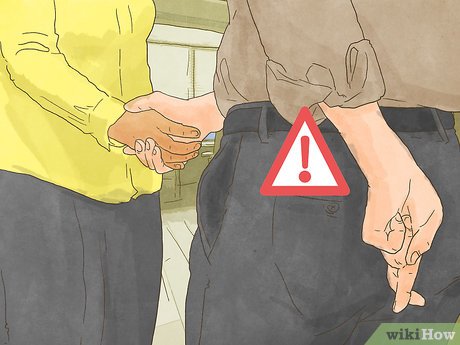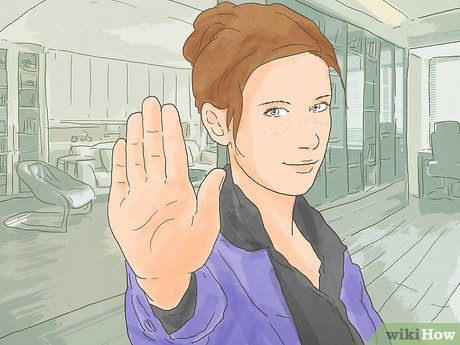How to Get an Agent
Part 1 of 3:
Getting Experience
-
 Work as much as you can. The most important way to get an agent to represent you in the business, be it acting or music, is to get out there and start doing your craft. Agents look for talented and already established artists with a track record they'll be able to profit from, not people who may be talented but who've never done anything in the business. If you want to get an agent for acting, you need to act first. If you want to be a singer, you need to perform.[1]
Work as much as you can. The most important way to get an agent to represent you in the business, be it acting or music, is to get out there and start doing your craft. Agents look for talented and already established artists with a track record they'll be able to profit from, not people who may be talented but who've never done anything in the business. If you want to get an agent for acting, you need to act first. If you want to be a singer, you need to perform.[1]- Go to every open call-out for actors and take whatever work you can get. The experience may not be glamorous, but it's experience that you can use to move up in the world. If you play music, get on every open-mic, local festival, and radio show that will have you and listen to your music. Get your name out there as a reliable worker.
-
 Perfect your craft. Aside from getting as much experience working as you can, you also need to practice and perfect your skills by taking lessons, workshops, or classes related to your craft. Even if you want to be a stand-up comedian, there are craft-centered workshops in which you learn stage-timing and receive feedback from experience joke-tellers. Find a class or workshop in your area and sign up for it.
Perfect your craft. Aside from getting as much experience working as you can, you also need to practice and perfect your skills by taking lessons, workshops, or classes related to your craft. Even if you want to be a stand-up comedian, there are craft-centered workshops in which you learn stage-timing and receive feedback from experience joke-tellers. Find a class or workshop in your area and sign up for it.- If you don't enjoy the work itself, there'll be no point in getting an agent to help you get more of it.
-
 Talk to other performers. Start building a network of actors or musicians whom you trust and can use for guidance in building a career. You'll be able to use them for craft tips most importantly, but they'll also prove useful when it comes time to meeting agents. If you've got an actor friend who has scored representation from a licensed agency, you might have an "in" with that agency if you've worked together and shared resources in the past.[2]
Talk to other performers. Start building a network of actors or musicians whom you trust and can use for guidance in building a career. You'll be able to use them for craft tips most importantly, but they'll also prove useful when it comes time to meeting agents. If you've got an actor friend who has scored representation from a licensed agency, you might have an "in" with that agency if you've worked together and shared resources in the past.[2]- Help out other performers, too. If you hear about an open call-out for actors, tell your actor friends rather than hiding it from them and hoping to keep it a secret so you'll get it for yourself. When a friend wins a part, celebrate. Spreading the wealth around benefits everyone and will make them more willing to help you out if you need it.
Part 2 of 3:
Meeting Agents
-
 Understand what agents do and what they look for. Some successful and famous actors--Bill Murray is a notable example--don't have agents, and choose to do that work on their own. An agent is someone who secures auditions, contacts casting directors, and networks in the industry on your behalf. For them to take you on as a client means that they must believe that eventually you'll make them money.
Understand what agents do and what they look for. Some successful and famous actors--Bill Murray is a notable example--don't have agents, and choose to do that work on their own. An agent is someone who secures auditions, contacts casting directors, and networks in the industry on your behalf. For them to take you on as a client means that they must believe that eventually you'll make them money.- Generally, an agent-client relationship is based on contracts to be signed,[3] rather than a monthly fee. In other words, your agent will get you a paying gig and retain a certain percentage of the work. If you're difficult to book, an agency will be unwilling to take you on, because they won't make any money from you.
- To secure an agent, you must either be exceptionally charming and personable, experienced, or--ideally--a combination of both.
-
 Build your social media presence. Brand yourself under your new public persona and start building your presence on Facebook, Twitter, Instagram, and other social media platforms. Use these tools to make connections and keep up with friends in the industry, as well as to research agents and agencies.[4]
Build your social media presence. Brand yourself under your new public persona and start building your presence on Facebook, Twitter, Instagram, and other social media platforms. Use these tools to make connections and keep up with friends in the industry, as well as to research agents and agencies.[4]- Use the cocktail party rule of thumb: treat social networking as a professional platform. Never say anything to someone you're hoping to network with professionally that you wouldn't say to them at a cocktail party to their face. Use social networking to market new shows you're acting in or gigs you've booked as well as to congratulate others on their successes.[5]
-
 Create a résumé and press pack. Typically, a press kit will involve headshots, references from other actors or directors you've worked with, and any other press material you may have received, as well as a brief sample of your work. A resume is a formalized list of all your work experience as related to the field. In other words, no need to list your high school fast food jobs on your acting resume.
Create a résumé and press pack. Typically, a press kit will involve headshots, references from other actors or directors you've worked with, and any other press material you may have received, as well as a brief sample of your work. A resume is a formalized list of all your work experience as related to the field. In other words, no need to list your high school fast food jobs on your acting resume. -
 Ask for a recommendation. Ask other actors to recommend you to their agency and see if you can secure a consultation meeting at some point in the near future. Discuss you desire to secure representation from the agency and your goals for your career.
Ask for a recommendation. Ask other actors to recommend you to their agency and see if you can secure a consultation meeting at some point in the near future. Discuss you desire to secure representation from the agency and your goals for your career.- Be realistic and avoid over-doing it. No one wants a needy and desperate wanna-be star annoying them in their office. If you're a professional, act like it.
- Avoid cold calls. Back in the day, you used to send unsolicited headshots to an agency to secure a meeting, but this is largely not the case anymore. You need to either get a recommendation from another representative of the agency, or attend an open call-out or workshop an agency or group of agencies puts on to find talent.
-
 Prepare an audition. If you secure a meeting, you may need to audition for your agent just as you would for a part. Prepare a couple of monologues or a scene to perform on the spot in case you need to. You don't want to waste a valuable opportunity by being unprepared.
Prepare an audition. If you secure a meeting, you may need to audition for your agent just as you would for a part. Prepare a couple of monologues or a scene to perform on the spot in case you need to. You don't want to waste a valuable opportunity by being unprepared.
Part 3 of 3:
Choosing an Agent
-
 Make sure your agency is licensed and franchised. Agencies are typically regulated by the state economy and need to kick back a certain percentage (usually 10%) of their income to the state. There are many people claiming to represent talent who lack this and seek to exploit inexperienced actors who don't know their way around the business.
Make sure your agency is licensed and franchised. Agencies are typically regulated by the state economy and need to kick back a certain percentage (usually 10%) of their income to the state. There are many people claiming to represent talent who lack this and seek to exploit inexperienced actors who don't know their way around the business.- To check the registration of a particular agency in California, visit the Department of Industrial Relations website: http://www.dir.ca.gov/databases/dlselr/talag.html
-
 Find out how many other clients your agent represents. Colleges will typically advertise the teacher-to-student ratio, meaning that a good school will supposedly have fewer students per teacher, resulting in more face time and contact. You're looking for the same thing with an agent.
Find out how many other clients your agent represents. Colleges will typically advertise the teacher-to-student ratio, meaning that a good school will supposedly have fewer students per teacher, resulting in more face time and contact. You're looking for the same thing with an agent.- An overworked, overbooked agent from a big agency who decides to take you on might end up being less valuable than a more devoted agent with fewer clients from a smaller agency.
-
 Make sure you get along as people. Your relationship with your agent is a real interpersonal relationship, not just a work relationship. You need to pick someone who you can get along with and openly discuss your plans and ambitions with. An agent you're intimidated by or one who doesn't really believe in your talents won't be the best career choice in the long run.[6]
Make sure you get along as people. Your relationship with your agent is a real interpersonal relationship, not just a work relationship. You need to pick someone who you can get along with and openly discuss your plans and ambitions with. An agent you're intimidated by or one who doesn't really believe in your talents won't be the best career choice in the long run.[6]- In your first few meetings, discuss your plans for yourself. Ask the agent what they see in you and where they think you might go. Seeing if your plans match up will be a good way to judge the workability of the relationship.
-
 Don't be afraid to make the break. If you've got a dysfunctional relationship with an agent who is misrepresenting you or representing you lazily, you need to find a new one. Be patient and don't expect much too soon, but if your agent is purposefully blowing you off or you feel like you're being taken advantage of, make the break.
Don't be afraid to make the break. If you've got a dysfunctional relationship with an agent who is misrepresenting you or representing you lazily, you need to find a new one. Be patient and don't expect much too soon, but if your agent is purposefully blowing you off or you feel like you're being taken advantage of, make the break.- Many young actors are scared to try for new representation for fear of losing the stability of the old relationship. "Even if I'm not working," says the young actor, "at least I have an agent." But an agent who isn't getting you parts might as well not exist. If the relationship isn't working out like you want it to, you have to take the initiative to find a new one.
Share by
Samuel Daniel
Update 24 March 2020











